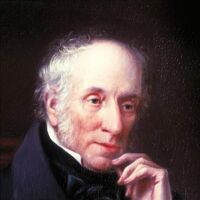
Lucy V: A Slumber did my Spirit Seal
I had no human fears:
She seemed a thing that could not feel
The touch of earthly years. No motion has she now, no force;
She neither hears nor sees;
Rolled round in earth's diurnal course,
With rocks, and stones, and trees.
William Wordsworth talks about the death of a female, probably a lover. He explains and describes her death and how he sees her in that state. The first two lines tell us about the author, or the speaker, the poetic voice through which the author speaks. “A slumber did my spirit seal” could mean that the speaker was in some sort of a lethargic state, as if he wasn’t living in reality but rather in fantasy, or in a twisted dream. Saying that he had “no human fears” could mean that he was a brave man, even in moments of tragedy. It could also mean that he had once been a brave, strong man, one that could not be easily broken until tragedy struck in the form of this woman’s death. In the lines
The touch of earthly years”
he is referring to how she seems like she doesn’t age. Those lines hint at us that the woman has died (she cannot age for she is dead). Her death is only implied throughout the poem, never addressed directly, however in the second stanza it becomes clearer and almost painfully obvious that he is describing his possible lover’s death. The eerie, cryptic atmosphere created by the description serves to show the pain and agony that the author was suffering when writing the poem, which may also be the reason why he does not address the matter directly. This might be interpreted as her death being far too overwhelming for him to even mention it in a direct manner. The lines
tell us how she is lying still, how she is now an inanimate object, devoid of life. It can subtly imply that she had once been an energetic person, not one to stay put in one place for long. Addressing her current lack of senses can also imply that the woman might have been one to live life fully, using all of her senses to enjoy each day. He emphasizes how she can no longer enjoy the world through sight or sound by stating that she can no longer see nor hear; he also mentions how she is part of the earth now:
Rolled round in earth’s diurnal course
With rocks, and stones, and trees.”
The last two lines explain how her body has decomposed and has become one with earth, how she is now a part of nature. An interesting little detail in the last line is how he mentions “rocks” and “stones”, which are synonyms. Is it an intentional redundancy that emphasizes some aspect I’m missing? Maybe he wants to make it very clear that she is now as inanimate and lifeless as rocks are, for trees are inanimate but they are alive.
A very nice poem indeed, with a dark atmosphere, that somehow depicts beauty in a sort of creepy way.










